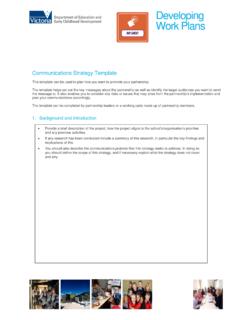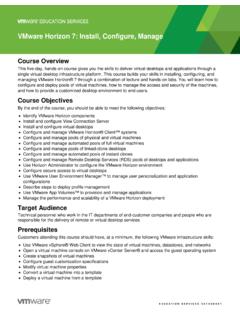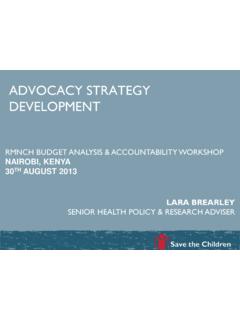Transcription of Media Relations 101 A Guide to Media Relations …
1 Media Relations 101 A Guide to Media Relations for the not-for-profit sector Based on the workshop delivered to members of the Community Integration Network January 9, 2012 Toronto, Ontario _____ Karen Flanagan McCarthy McCarthy Media Group 393-C Richmond Road, Suite 158 / Ottawa, Ontario K2A 0E9 Copyright 2012 Karen Flanagan McCarthy All rights reserved. No part of this publication may be reproduced or transmitted in any form or by any means, or stored in a database and retrieval system, without the prior written permission of the publisher. - 2 - T A B LE OF C ON T EN T S INTRODUCTION - 3 - DO THE Media WANT? WHAT DO THEY NEED? - 3 - THE Media : WHO THEY ARE. HOW TO KEEP TRACK OF THEM. - 4 - WHY DO THE Media COVER THE STORIES THEY COVER? - 4 - ONE THING YOU SHOULD NEVER ASK A JOURNALIST - 5 - WHO ARE YOUR TARGET AUDIENCES?
2 - 5 - CREATING KEY MESSAGES - 6 - THINKING LIKE A JOURNALIST - 7 - FINDING THE STORYTELLERS IN YOUR ORGANIZATION - 7 - PITCHING YOUR STORY TO THE Media - 8 - THEY'RE INTERESTED! YIKES! NOW I HAVE TO DO THE INTERVIEW!! - 9 - TEMPLATE: THE INTERVIEW PLANNER - 11 - TEMPLATE: CREATING KEY MESSAGES - 12 - - 3 - Introduction Do you ever wonder why some organizations seem to get a lot of Media attention? Why are reporters interviewing their volunteers, board members and clientele? Why are pictures of their events on the front page of the local newspaper? What do their staff know that you don't know? They know what the Media want and what the Media need. (And they know it's not always the same thing!) They know who their target audiences are and how to craft key messages. They know how to pitch a story. Most importantly, they know how to research and think like a journalist to find those stories within their own organization.
3 Do the Media want? What do they need? The Media want a good story. Actually, they want a lot of good stories. Don't forget: the Media have hours of programming to produce and pages of newspaper to fill every day. The Media want good storytellers. Something new. Oh, and an exclusive would be nice, too. You might be able to get through your day without listening to a newscast, or without reading a newspaper or checking the latest news online. But the folks who report on what is happening in your community, your country, your world, cannot get through the day without stories. And you can provide them with great stories. The Media need access to the people who will help them tell the stories we read, listen to or watch. They don't tell stories about events or issues. They tell stories about how those events or issues affect people. How many times have you been introduced to a family in Some Suburbia, Your Province, Canada on the day the Federal Budget is tabled in the House of Commons?
4 The Media always seems to have a 'typical' Canadian family on tap: the stay-at-home parent, the public servant parent, the kids - maybe in primary school or heading off to university - all of whom will be affected in one way or another by what is in the federal budget. And that's how the Media explain a complex story in terms we can all understand. What else do the Media need, in addition to the people that can help them tell the story? They need accurate information, reliable sources, compelling audio clips and visuals. They also need to meet their deadline. That's important to remember when dealing with the Media . Many journalists are meeting multiple deadlines every day, especially those who work in radio or online. - 4 - The Media : Who they are. How to keep track of them. Now that you know what the Media want and what they need, it's time to find out just who the Media in your community are.
5 Begin by becoming a savvy news consumer. Watch television news programs. Spin the dial when you are listening to the radio. Continue to read your newspaper of choice -- and any others you can get your hands on. Don't ignore the weekly newspapers. What are the local television news programs? What time are they on air? What are the local radio stations -- and what are the local shows on those programs? What kind of stories do they cover? Reporters may be general assignment reporters who cover a wide range of stories, or specialists, working a particular beat: social issues, health, education, arts, or municipal affairs. Take note of those who cover issues of concern to you or your organization. Remember that there is a difference between reporters who are paid to provide balanced coverage of an issue and columnists who are paid to give their opinion.
6 If you don't have a Media list, either buy a list from a Media list service or pull together one yourself. Companies like Cision ( ) provide a wide variety of services: from creating a Media list to distributing your news releases to monitoring the news to see who covered your story. The services are not free, but when you consider the time it takes to compile a Media list and maintain it, you might be able to justify the cost. If you opt to create your own Media list, make sure it contains the following information: Journalist's name and contact information Information about the show, magazine, newspaper, etc. Deadline Lead time needed Update your Media list regularly. It is a time-consuming, but worthwhile process. Keep a clippings file. It's a good way of keeping track of who is covering what. Why do the Media cover the stories they cover?
7 There are as many answers to this question as there are stories covered every day. Here are some of the reasons why the Media cover the stories they do. It is breaking news. There is a sense of urgency to this story. Think: tsunamis; earthquakes; a gas main break downtown; an accident that closes a main thoroughfare; a homicide; a long-awaited decision on a high profile court case. - 5 - They may cover a story because it is sensational. Or because it is a story that directly affects their audience . Maybe it helps put an issue in context. Their readers/viewers/listeners have a connection to the story, the people involved and / or the place. Perhaps the story is being told by a well known storyteller. If it is a television story or a story for the newspaper, sometimes just having good visuals is reason enough to cover the story. And, sometimes, a story makes it to print or on air because it is a slow news day!
8 One thing you should never ask a journalist Would you publicize our event? Journalists are not publicists. They will not publicize your event. If you have a good story for them, they may be interested. Ask them for publicity and they won't answer your email or take your call. Go back to the first section: what the Media want and what they need. Stories. A fundraising event is not necessarily a story. A new executive director doesn't usually make the newscast. But if you start thinking like a journalist, you will find the stories in your organization that will get Media coverage. Who are your target audiences? Who is it you want to reach through a story in the Media ? Who do you want to talk to? Don't say 'the public'. That's a vast audience . Be specific. Are you trying to reach politicians? Policy makers? Donors? Potential donors or fundraisers?
9 Special interest groups? Clients? Community groups? Volunteers? Students? What do they care about? What would their interest be in the story you want to tell? The Media are not a target audience . They are the means by which you reach your target audiences. You speak through the Media to those politicians, policy makers, potential donors, clients, volunteers, etc. But remember: when it comes to the print Media , the journalists have final say about what is published. If you tape a radio or television interview, you won't be asked which 'clips' you think should be used. That's why it's extremely important to prepare for an interview. Make sure you know who you are talking to and what you want to say. - 6 - Creating key messages A story can have more than one target audience . And each target audience will have its own interest in or concern about the topic of the story.
10 For example, you are on the board of a charitable organization that has created an ice hockey league for youth who, due to a disability, have been deemed ineligible to play on any other hockey team. You want to get the word out through the Media about an upcoming golf tournament that will raise funds for the organization. A silent auction is also planned for the day of the tournament. Who are your target audiences? Golfers (The more people who participate in the tournament, the more money you will raise.) Individuals and organizations who will donate items to the silent auction Potential volunteers - coaches, etc. People who will donate money to your organization so you can rent ice time Sports stores, other hockey teams or young athletes who might be moved to donate equipment Parents who have difficulty explaining to their children why they can't join a hockey team, like their big brother or sister.








